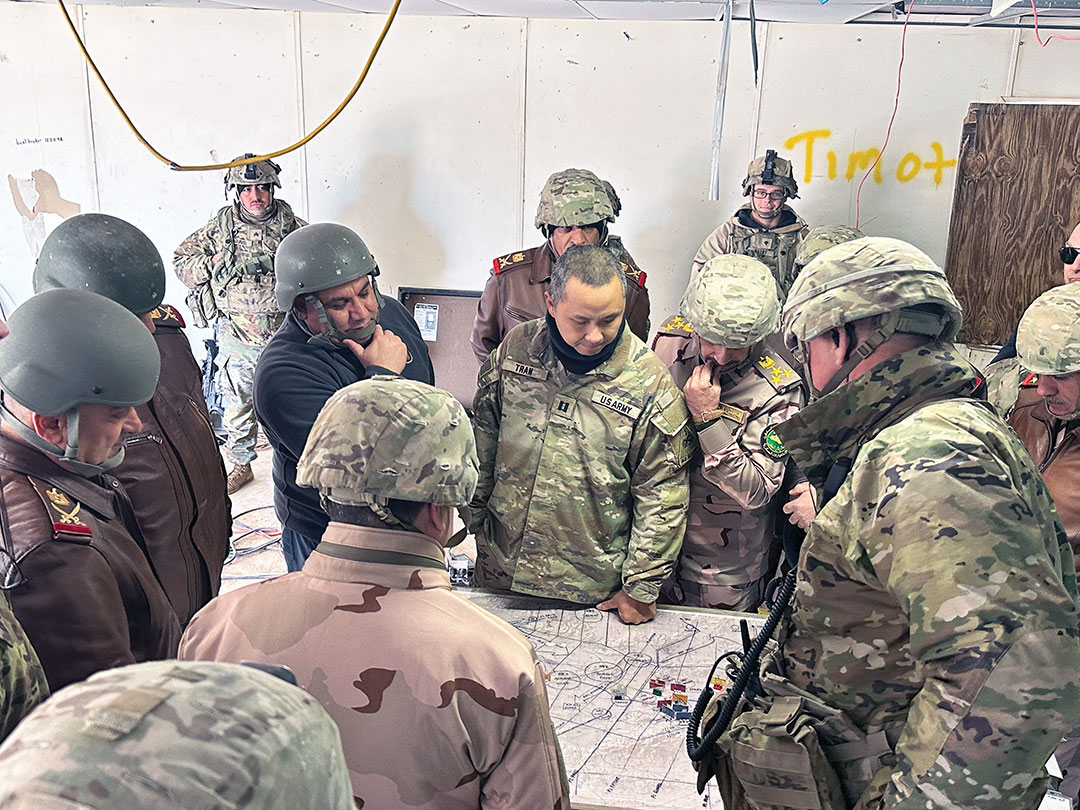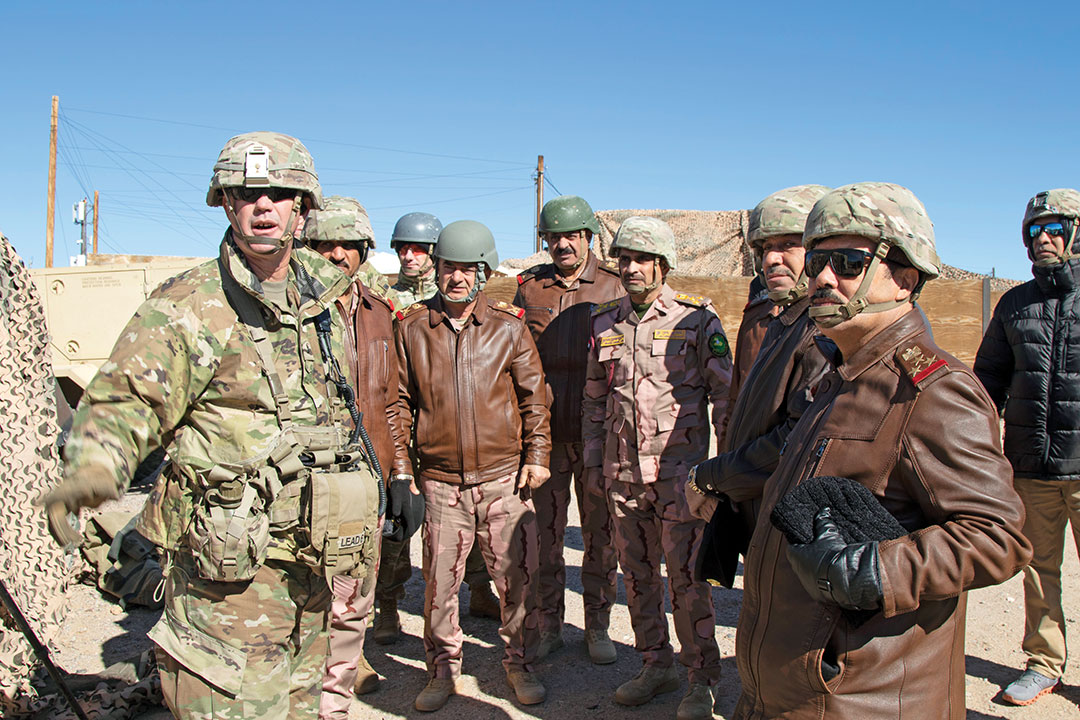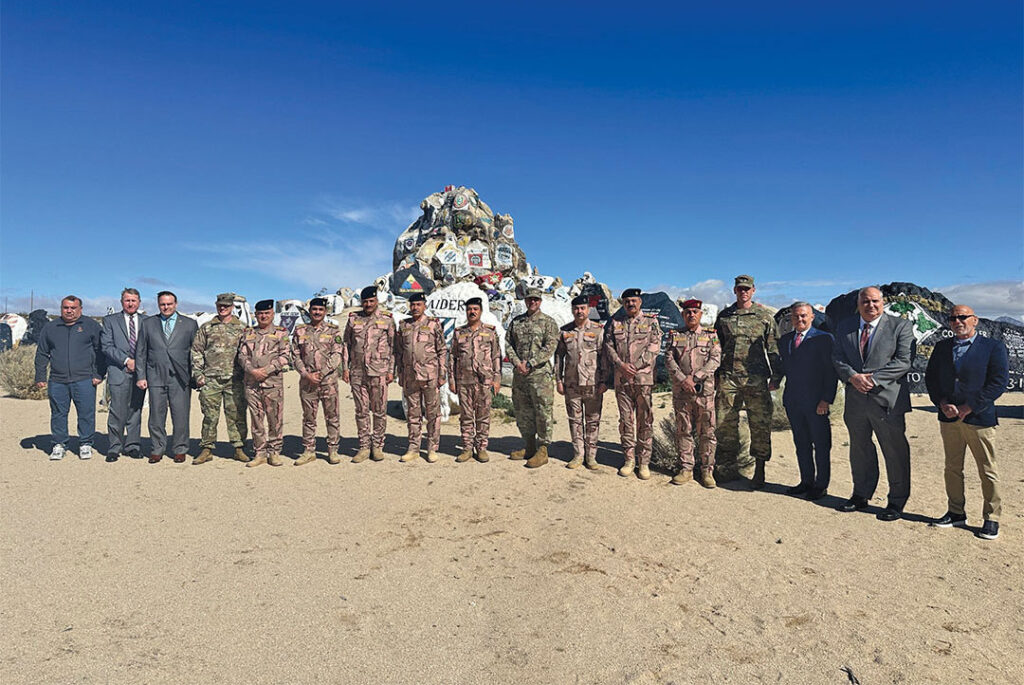A delegation of senior Iraqi officers tours the U.S. Army’s National Training Center
Unipath Staff | Photos by U.S. Army National Training Center
A high-level delegation from the Iraqi Ground Forces Command visited the U.S. Army’s National Training Center (NTC) at Fort Irwin, California, from February 7 to 12 to inspect the training center’s techniques and facilities. The visit included several lectures on the role of the NTC in training units before sending them on missions in their various spheres of operation. The delegation also met with U.S. Army Maj. Gen. Curt Taylor, commander of NTC/Fort Irwin, who accompanied them on a field visit during which he outlined the objectives of the center. The delegation also discussed with U.S. trainers the possibility and the steps for establishing an advanced training center in Iraq. The trainers explained how to develop a detailed plan, linked to the Directorate of Lessons Learned and military academies, to establish a center capable of training a brigade-sized force. Unipath met with Maj. Gen. Qasim Hamid Abbas Al-Jubouri, Director of Planning at the Iraqi Ground Forces Command, to talk about the importance of the visit.
Unipath: What is your impression from this visit and its benefits for Iraq?
Gen. Qasim: We were very impressed by what we saw and by the high quality of training that the NTC provides. What we saw and understood from visiting the training grounds is how trainees, be they individual soldiers or units, are given a genuine experience of battle using different terrains, rugged roads and populated cities in the theater of operations, which obliges military units to act as though they are in a real battle. The center’s leaders also focus on the spirit of competition and perseverance among participating units, and the presence of an experienced team of trainers that plays the role of enemy forces. Commanders of participating units are given full responsibility for how they conduct battle. Center commanders lay out battle scenarios to the brigade commanders. Then step back and observe, giving the brigade commander full freedom to choose tactics that help him achieve objectives. This method enhances the role of the commander and adds to his field experience. I would like to extend my sincere thanks to its commanders who did everything they could to explain and show us details of the center and its functions.

a battlefield map.
Unipath: Do you wish to establish a similar center in Iraq?
Gen. Qasim: All the officers who came with me on this visit were impressed and admired the center and its role in improving and honing the skills of security forces’ affiliates. We certainly hope that the Iraqi army could have a center similar to this impressive facility. Such a center would develop the capabilities of the valiant Iraqi Army and afford them field skills through simulation of war environments and tactics adequate to various terrains. It would enhance its capabilities through training and creating a genuine battle experience for commanders and Soldiers. It will boost the leadership skills and decision-making process of commanders in managing battles, whether at the level of the unit that came for training or the personnel at the center who play the role of the enemy force.
Unipath: How did you find the performance of the forces at the center, like the trainers and the deployed forces?
Gen. Qasim: Through our meetings with the commanders and other personnel, whether they were the forces undergoing training or those from the center role-playing as the enemy, and from what we saw in the field, these forces were getting high-level training. All the participants gained field experience at every level. Both Soldiers and officers demonstrated a high level of training and competence, ensuring their cohesion and effectiveness on a real battlefield. We watched a brigade-sized force entering the theater of operations with the mission of liberating difficult terrain from an entrenched enemy. The brigade commander and his staff officers were given the freedom to plan and execute the liberation of the area with minimal human and material losses. The scenario included challenges in delivering supplies to the advancing forces and navigating the battlefield. On the other side, enemy commanders set up fortified defenses to repel the brigade’s attack and hold their territory. They drew up plans and adapted them to changing conditions on the ground. The difference between this center and the division’s training centers is that the brigade leaves its headquarters and moves with all its equipment as if it were moving toward the front lines. The trip from its headquarters to the center may take days. Upon arrival, the brigade deploys in its theater of operations, and the Soldiers live for 14 days (the duration of the training) in tents they brought with them. Separate briefings are held every three days on operations, intelligence and logistics to discuss any mistakes and how to avoid them. The performance of the units is monitored by the center’s commanders using a variety of sensors and observation and tracking technologies attached to all the Soldiers and their equipment. These monitor and record casualties and losses in the field and indicate the course of the operations. As a result, all members of the brigade gain cumulative experience that can be used in real-life scenarios. The commanders of the enemy force also gain a wealth of experience that can be put to use in real-life battles.

Unipath: How important is partnering with the U.S. Army to develop Iraqi land forces?
Gen. Qasim: Everyone is aware that the U.S. Army, with its capabilities, technologies and skills — in both material and morale — is the best in the world. It has a wealth of experience from fighting wars in different terrains and conditions. There is no doubt that by partnering with our forces, particularly the ground forces, the U.S. Army can offer a great deal to increase our units’ readiness to carry out their missions to the fullest. Such a partnership will benefit both our own ground forces and the U.S. Army. By working with the U.S. Army in Iraq, we benefited from its experience in planning, operations and logistics. In return, it benefited from our knowledge of the territory and the people, as well as our familiarity with fighting in harsh environments such as the Hamrin Mountains and the desert regions of western Iraq, which were considered unfamiliar environments to them. We work with the U.S. Army through advising and training centers, where it has introduced us to modern technologies and tactics that differ from what we previously had. This has benefitted the readiness and flexibility of our forces.
Unipath: Could you tell us about Iraqi army training centers?
Gen. Qasim: We have a large number of training centers in the Iraqi army specializing in tactical military training. These receive large numbers of new recruits and provide them with basic training, after which they are assigned to various military units and divisions. There they get specialized training in the specific skills and specialties the unit needs. In addition, every regiment has a training center where it can train its units at the company or battalion level. There is also the training camp at Habbaniyah that has the capacity to train Soldiers up to the level of general. That is where we trained during the Iron Hammer exercise in 2023.
Unipath: How did Iraqi training curricula change after the events in Mosul and the battles of liberation from Daesh terrorist gangs?
Gen. Qasim: There are always lessons to be learned that the various military divisions can benefit from. Such field experiences are being included in the curricula of military training facilities such as the Military Training Directorate, the Staff College, the War College and other military training institutions. These institutions analyze technologies and tactics used in battles around the world and provide advice to the Directorate of Lessons Learned on ways to confront new challenges so that we can develop training and fighting techniques for our forces. Extensive studies and research have been done on what happened in Mosul, and how to avoid the field and strategic mistakes that led to the fall of the city. Research was also conducted on all military operations to liberate cities and how to tackle the tactics used by Daesh. These lessons were integrated into the training curricula, particularly after the elimination of Daesh terrorist elements. Furthermore, we continue to carry out efforts in various sectors to combat sleeper cells in the theater of operations. I assure you, there have been noticeable developments in training curricula and methods applied in training centers to enable ground forces to handle any threats that they might face.

Unipath: How does the Directorate of Lessons Learned operate?
Gen. Qasim: To begin with, lessons learned were primarily derived and recorded by combat units during liberation battles carried out between 2014 and 2017, when final victory was declared. We analyzed these battles and documented lessons learned from them. Also, a specialized agency was set up to collect lessons and experiences. The agency is linked to the Directorate of Military Training and shares all its studies and lessons with training centers and military training academies. They also share them with the various military divisions and commands so they may benefit from them at later stages, either for training or in combat.
Unipath: Would you like to send an officer from the Iraqi Ground Forces as an observer at the NTC?
Gen. Qasim: In fact, Maj. Gen. Taylor, commanding general of the NTC, suggested this to us. We will be looking into it with command and our people in Baghdad to make a decision. Personally, I would like to have an Iraqi officer in this center to get a better understanding of the activities — such as training and competitions — that take place. During our four-day visit we got to see a large part of the center, but not in as much detail as we would have liked. So the presence of an officer here would help bring a clearer and more in-depth picture to our senior commanders so we can decide whether to establish such a center in Iraq.

